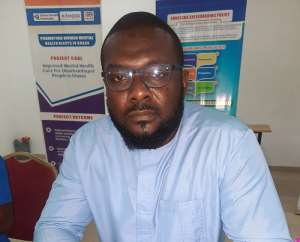
There is high level of depression amongst alleged witches at the various alleged witches’ camps in the country further compromising their quality of life, a study has found.
The study has found that sociodemographic factors such as gender, marital status, widowed or separated, and not having biological children contributed to the depression.
It has also been found that although witchcraft is framed within a sociocultural context, the narrative within its practice is highly gendered with power relations, and gender agency playing a critical role.
It has also been found that men, who are accused of witchcraft, have the opportunity and power of negotiating and renegotiating their destinies and the varied outcomes of witchcraft accusations, and are neither banished nor mistreated.
The study was conducted from November, 2021 to February, 2022 to determine the prevalence of depression, quality of life and gender dynamics of women accused of witchcraft in Northern and North East Regions.
All 277 individuals accused of witchcraft and residing at alleged witches’ camps in the Nanumba South, Yendi, Gushegu and East Mamprusi Municipalities in the two regions were captured as part of the study while in-depth interviews on beliefs about witchcraft, gender dimensions, reintegration and protection of human rights were also conducted.
The study was commissioned by Songtaba, a women and child rights advocacy organisation, as part of its Promoting Women Mental Health Rights in Ghana project being implemented in partnership with the Ghana Somubi Dwumadie programme with funding from UKaid.
The project seeks to improve mental health care for disadvantaged people in the country especially the alleged witches, who are a group of excluded persons and living in very deplorable and disadvantaged situation.
Mr Abdul Kasiru Shani, Head of Programmes and Policy at Songtaba, who presented the findings at a media forum in Tamale, said the findings of the study showed that “The lack of resources works together with sociocultural beliefs about power put women more vulnerable in witchcraft accusations and banishment.”
The presentation of the study formed part of activities by Songtaba to commemorate this year’s International Women’s Day to draw attention to the plight of especially women accused of witchcraft and the need to take steps to disband the alleged witches’ camps in the country.
The study also found that majority (93.5 per cent) of the people accused of witchcraft were females and 66.5% of them were widows, and they all revealed being maltreated at their communities of origin when they were accused before being banished.
The study recommended that Ghana Health Service should expand mental health services to cover inmates of alleged witches’ camps by periodically screening them to improve their mental health status.
It recommended the need for the assemblies where the alleged witches’ camps were located to allocate funding towards improving the living conditions of the camps to make them more habitable in the interim whilst initiating plans to relocate them to their communities.
It also reiterated the need for the government to enact laws to criminalise witchcraft accusation to ensure that accusers were severely punished.





 Lay KPMG audit report on SML-GRA contract before Parliament – Isaac Adongo tells...
Lay KPMG audit report on SML-GRA contract before Parliament – Isaac Adongo tells...
 Supervisor remanded for stabbing businessman with broken bottle and screwdriver
Supervisor remanded for stabbing businessman with broken bottle and screwdriver
 NDC watching EC and NPP closely on Returning Officer recruitment — Omane Boamah
NDC watching EC and NPP closely on Returning Officer recruitment — Omane Boamah
 Your decision to contest for president again is pathetic – Annoh-Dompreh blasts ...
Your decision to contest for president again is pathetic – Annoh-Dompreh blasts ...
 Election 2024: Security agencies ready to keep peace and secure the country — IG...
Election 2024: Security agencies ready to keep peace and secure the country — IG...
 People no longer place value in public basic schools; new uniforms, painting wil...
People no longer place value in public basic schools; new uniforms, painting wil...
 'Comedian' Paul Adom Otchere needs help – Sulemana Braimah
'Comedian' Paul Adom Otchere needs help – Sulemana Braimah
 Ejisu by-election: Only 33% of voters can be swayed by inducement — Global InfoA...
Ejisu by-election: Only 33% of voters can be swayed by inducement — Global InfoA...
 Minority will expose the beneficial owners of SML, recover funds paid to company...
Minority will expose the beneficial owners of SML, recover funds paid to company...
 Prof. Opoku-Agyemang has ‘decapitated’ the NPP’s strategies; don’t take them ser...
Prof. Opoku-Agyemang has ‘decapitated’ the NPP’s strategies; don’t take them ser...
